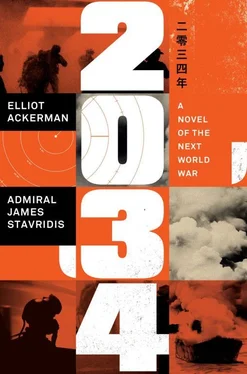The following week, the Rezkiy , Pyotr Velikiy , and Kuznetsov altered their course southward, toward Kaliningrad. Farshad didn’t believe this merited notification of Bagheri’s staff in Tehran. They would, he assumed, be returning to their home port. But when the Kuznetsov held fifteen miles short of Kaliningrad and began preparing for flight operations in Gdańsk Bay, Farshad knew they weren’t returning to port, at least not yet. When the first sorties of Su-34 Sukhoi attack aircraft catapulted off the deck of the Kuznetsov , their wings drooping with munitions, Farshad disappeared into his cramped quarters and quickly fired off another dispatch to his superiors, notifying them of developments but providing no analysis of his own. Farshad knew enough to know that an incorrect analysis of the situation could only be used against him later and that a correct analysis would gain him little. Before he could shut down his laptop, a cursory reply arrived from the General Staff: Acknowledged. Continue to monitor.
Farshad returned to the bridge to find Kolchak in command of the Rezkiy as they circled the Kuznetsov , screening for threats to the much larger carrier, close as they were to the coastline. Farshad could see the shore through his binoculars, a ribbon of dark rocks in the hazy distance. He estimated it was perhaps a dozen miles off. Not even an hour had passed since the first launch of Sukhois and already they’d returned across the coast and were “feet wet,” safely over the water. Farshad observed them through his binoculars: their wings were empty. The Sukhois had dropped their munitions. When the aircraft came a little closer and entered the flight pattern to land on the Kuznetsov , he could make out soot-darkened smudges on the gun ports at either side of the cockpit. The cannons within those gun ports had been firing.
Kolchak saw it too. With his binoculars raised he watched the Sukhois as they landed. “Looks like they got in pretty close,” he said, and then called out a new heading and speed to the helmsman before smiling triumphantly at Farshad, who struggled to know how he should react to his ally’s apparent victory, given that his Russian counterparts had not as of yet taken him into their confidence as to their mission.
As the first sorties landed, refueled, and rearmed, all within sight of the Rezkiy , Kolchak explained to Farshad that aircraft from the Kuznetsov were flying close air support for an invasion force that, at this very moment, was “reclaiming ancestral territories that connect the Rodina to its northern ports on the Baltic Sea.” That these ancestral territories were part of present-day Poland mattered little. Weeks before in the wardroom, Kolchak had foreshadowed Russia’s interests in seizing a ribbon of land that would connect its mainland to its Baltic port at Kaliningrad. While the world’s attention was diverted to the Far East, they would use that crisis to their benefit. “Who will object?” Kolchak now asked Farshad rhetorically. “Not the Americans. They’re hardly in a position to lecture us on ‘sovereignty’ and ‘human rights,’ particularly not after Zhanjiang. As for the Chinese, they understand our actions intuitively. In their language the word for crisis and opportunity are one and the same. Look at the map.” Kolchak fingered it while his cigarette smoldered between his knuckles. “We carve this slice from Poland and connect it to us through Belorussia. The Poles will complain, but they won’t really miss it. And it sews up a tidy ribbon around Lithuania, Estonia, and Latvia. They, too, will soon return home to the Rodina. ”
Farshad opened his mouth to speak, but his words were drowned out by another section of Sukhois catapulting off the deck of the Kuznetsov . Ribbons of dark smoke began to tower upward on the horizon as the fighters struck their targets and advancing Russian ground forces seized their objectives. Farshad thought to disappear to his quarters belowdecks, to check if he had received another message from the General Staff in Tehran. His Russian counterparts would have thought little of it. They wanted him reporting back their every move, particularly on a day like this, in which each move brought them greater success.
Farshad thought the operation was reckless, even by Russian standards. Poland was a NATO member nation. Perhaps President Putin, now an octogenarian, had made a disastrous miscalculation in his old age. He looked up at the jets and wondered when NATO would respond. American disinterest over the previous decades had crippled the alliance. It felt antiquated, irrelevant, a shadow of its Cold War self. This year it had celebrated its eighty-fifth birthday. But it still had teeth, surely? Maybe not. Maybe of the two octogenarians locked in this conflict, it was Putin who’d kept his teeth over the years.
Before Farshad could send a further report from his quarters there was a commotion on the bridge. A single fighter had threaded its way between the Kuznetsov and the Rezkiy . It had come in low and fast, at less than one hundred feet, so that its twin engines blew ripples across the water’s surface. With the continuous comings and goings of the Russian Sukhois, it must’ve gotten confused in the mix. The aircraft was a MiG-29, its wings clearly marked with the red-and-white checkerboard pattern of the Polish Air Force. Everyone seemed to see it at once: Farshad, Kolchak, the entire crew of the Rezkiy . The collective shock of finding an enemy aircraft at so close a range caused them all to freeze, and in that moment a great silence enveloped them.
That silence was broken when the MiG-29 engaged its afterburners, arching upward, gathering altitude as it bled off speed. One thousand, two thousand, three thousand feet, it hung suspended above the flight deck of the Kuznetsov . Beneath the single Polish MiG, dozens of heavily armed Sukhois and their ground crews were, suddenly, exposed.
The MiG barreled over, nosing downward into its angle of attack.
Farshad glimpsed the MiG’s belly as it pirouetted. It wasn’t even outfitted with a full complement of munitions. Two bombs hung from a single rack; that was it. But that would be enough.
A flash and then a trail of smoke on the deck of the Rezkiy as it fired on the MiG.
The smoke coiled upward.
On the belly of the MiG, Farshad could see the bombs leave their rack, where they hung for a moment, suspended in air. Farshad could also see the profile of the pilot, a determined speck in the canopy. The last thing Farshad saw before the rocket fired from the Rezkiy destroyed the MiG and the twin bombs it attempted to drop, as well as the pilot who never had a chance to eject, was the gun ports on the aircraft.
They were clean, not soot-darkened like the returning Sukhois. Because in the end, after all of the commotion, the pilot of the MiG never got off a shot.
Farshad went belowdecks to send his report to Tehran.

07:55 July 06, 2034 (GMT+8)
Shenzhen
Lin Bao’s summons from the Politburo Standing Committee had come in the middle of the night. The unmarked transport that flew him off the deck of the Zheng He an hour later wasn’t one of his; it was sourced from another command. There were only two additional passengers aboard, both large, dark-suited men, clearly from one of the internal security branches. Lin Bao thought he recognized them from his last meeting with Minister Chiang in the British Airways lounge, though he couldn’t be sure. Thugs like these usually defied differentiation.
Читать дальше













